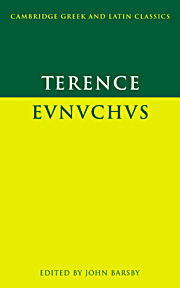Introduction
Published online by Cambridge University Press: 05 June 2012
Summary
TERENCE AND HIS BACKGROUND
Most of our information about the life and background of Publius Terentius Afer comes from the biography written by Suetonius in the second century AD, preserved for us (with an additional paragraph) by the fourth-century commentator Donatus. This tells us that Terence was born at Carthage and became the slave at Rome of the senator Terentius Lucanus, by whom on account of his intelligence and good looks he was given not only a liberal education but also his freedom. He enjoyed the friendship of many of the nobility, especially of Scipio and Laelius; he also gained the approval of Caecilius, the leading comic dramatist of the day, to whom he read the script of his first play, Andria, before it was approved for performance. After writing six comedies, allegedly with the help of his noble friends, Terence left Rome for Greece, still not yet twenty-five years of age, and died on the return journey. He left a daughter, who married into an equestrian family, and a small estate near the temple of Mars.
Suetonius, who quotes a number of conflicting sources, is himself unhappy with several of these details; and modern scholars have been even more sceptical. Terence's alleged Carthaginian origin could simply be a false deduction from the cognomen Afer (= ‘the African’), and the story of Caecilius reading the script of Andria is open to the chronological objection that Caecilius died two years before that play was performed.
- Type
- Chapter
- Information
- Terence: Eunuchus , pp. 1 - 32Publisher: Cambridge University PressPrint publication year: 1999



